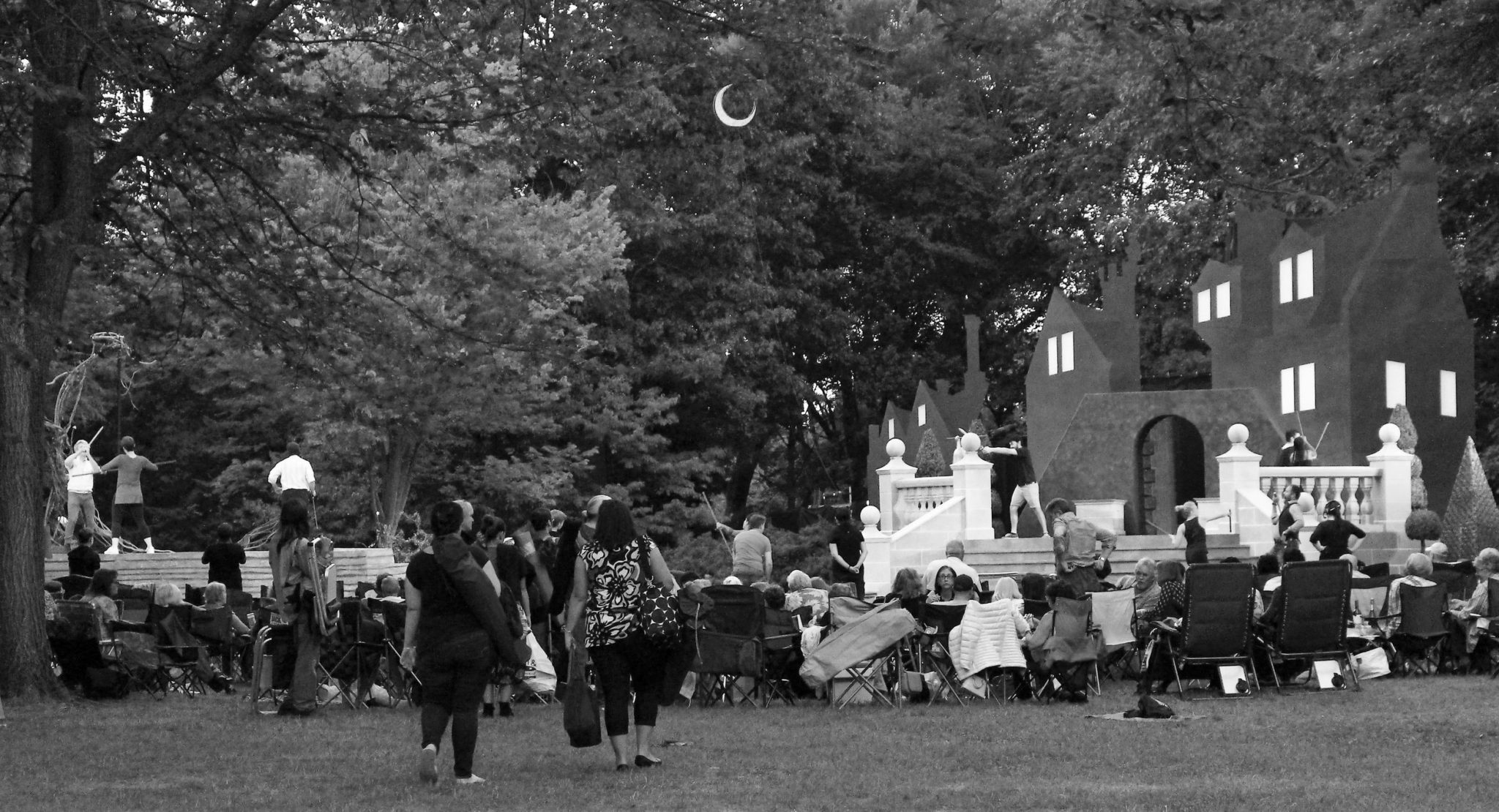
Elm Shakespeare
“Love’s Labour’s Lost” is not the deepest of Shakespeare’s plays; it is a comedy, and though it features the King of Navarre (Martin Lewis) and the Princess of France (Rachel Clausen), it is not explicitly political in nature. It is a romantic comedy, a farce of secretly attempting to get your letters to your lovers, a Russian nesting doll of sappy poetry and trying to look tough. The gender politics of four bros trying to court the eyes of four not-as-vocal-as-one-would-like women aside, Elm Shakespeare has put on an absolutely delightful show that kept me smiling the entire time.
The play begins with a vaguely cultic ritual orchestrated by Navarre as he convinces his friends Longaville (Michael Hinton), Dumaine (Kingston Farady) and Barowne (Aaron Bartz) to vow with him to abjure the presence and sight of women for three years of intense philosophical study, demanding that they may not enter within a mile of the palace. Barowne points out the foolishness of this endeavor given that the Princess of France, soon to arrive with her ladies in waiting, would surely throw a wrench in this plan; he is unable to convince his friends to relent, however, and hilarity ensues. Coupled with the fantastical Spaniard Don Adriano de Armano (James Andreassi), an absurd pair of priest and intellectual (Andrew Borthwick-Leslie and Benjamin Curns), and many other colorful characters, the show is a chaotic mess of mistaken messages and men hiding behind very tiny trees to stare longingly at women too good for them.
The show is set in early 1918, 100 years ago, and carries with it all the aesthetic delight of that era, beginning even before the first scene with a half hour of period-specific music performed by the live band King Kafetchua and the Congruent Epidethongs, perfect for dancing. The set, designed by Izmir Ickbal, consists of the vaguely Art Nouveau wrought iron entrance to the King’s estate, elegant, open and simple, but with enough little niches to allow for some games of hide-and-watch; the ante is upped, however, when the Cupid fountain erupts into a giant, beautiful lightbulb strewn gazebo, and, by George, I wanted to live on that stage. I would be remiss if I did not mention the splendid costumes, color-coded by couple to make sure that, no matter how much trouble you had with the language, you knew who was supposed to be with who. This matching of hues was perfect for the ending, when the ladies switch dresses and hide their faces to trick their romantic interests into flirting with the wrong women—this is, of course, mirrored by the men all dressing as Russian dervishes and dancing quite gymnastically.
The acting is great all around, though there are some standouts; the King of Navarre and the Princess of France are both strong royals, well-matched with palpable chemistry, and the build of their relationship is heartwarming until the moment when the Princess is informed of her father’s death and her ascension, at which point the sweet becomes heartbreaking as she now must return to rule. Armano is an over-the-top joy of a fool with more rolled r’s then I thought possible, and his sidekick Moth (Brianna Bauch) is a spunky wonder who isn’t afraid to make fun of him, and also managed to hold the longest note that I have ever heard in my life. My favorite character, and the most underrated by far, is Constable Dull (Patrick Toole), who might have had one of the finest deadpan performances I’ve ever seen on stage and made me laugh more than I have any right to based on how few lines he was given, a travesty of writing on Shakespeare’s part. And there was the finest, realest relationship, between Berowne and Rosaline (Lori Vega); theirs is a relationship with banter and wit and a joy of words, both fiercely themselves and fiercely into each other, though they, and especially she, have difficult saying it. I have been told that they are exactly like Benedick and Beatrice—I have never seen “Much Ado About Nothing,” but all I know is their love did not seem sudden, or rash, or baseless, or empty. Berowne and Rosaline love in the way that jaded people can find in each other something to make them question their cynicism. My heart glowed to watch them.
The production at Elm Shakespeare is creative, original, and has a sense of play like my greatest childhood dreams about what love could be; I would attribute this marvel to the spectacular direction of Rebecca Goodheart, the Producing Artistic Director of Elm Shakespeare. There are an endless array of details that I could list for hours, including sock puppet dogs, French kissing the floor, the very messiest pillow-fight-stage chaos, and kazoos! In short, I will just say this: Never before have I thought to myself while watching a play, “He should really eat that letter to hide his secrets.” And never before has he actually eaten the letter! “Love’s Labour’s Lost” is an absolute riot from start to finish, and even in that it manages to find some deep moments; not many, but a handful, and that is more than I deserved given the amount that it made me smile. And sometimes, that smiling is all we need.
Zak Rosen | zachary.rosen@yale.edu







